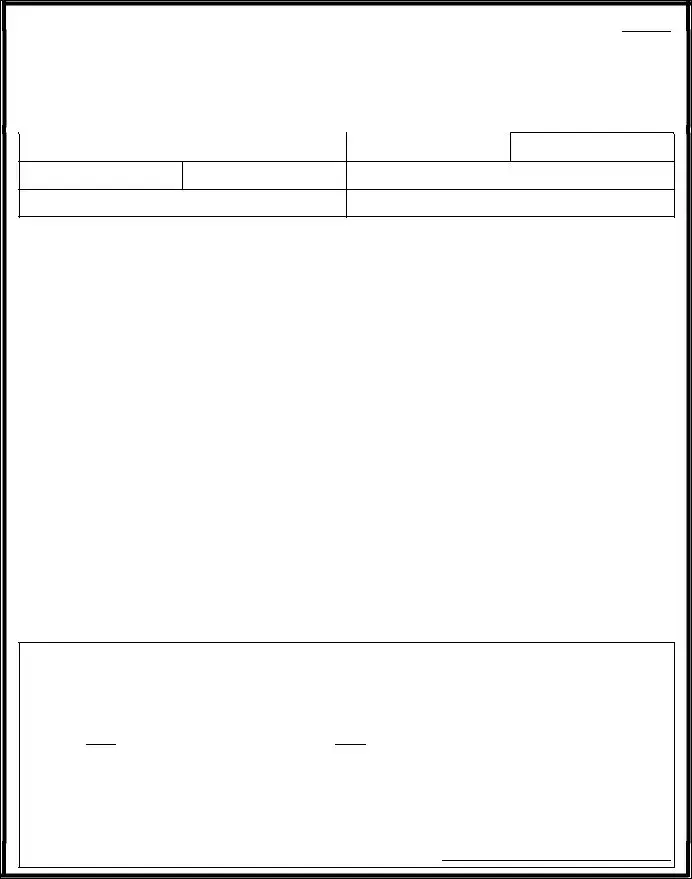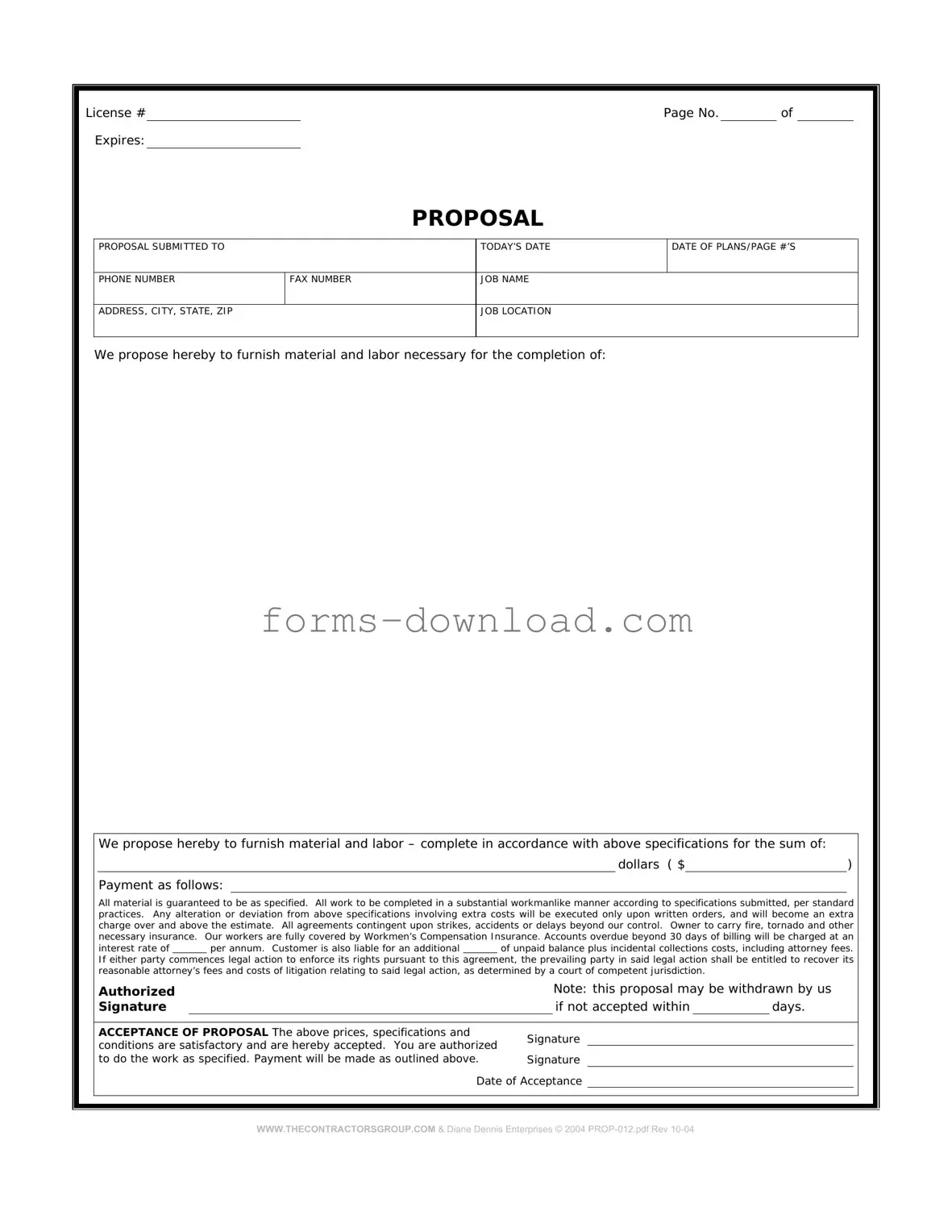Blank Construction proposal form Form
The construction proposal form serves as a vital tool in the building industry, acting as the bridge between contractors and clients. This document outlines the specifics of a project, including scope, timelines, and estimated costs, ensuring that both parties have a clear understanding of expectations. By detailing the materials to be used, labor requirements, and any additional services, the form helps to prevent misunderstandings that could arise later in the construction process. Additionally, it often includes a section for terms and conditions, which provides legal protection for all involved. A well-crafted proposal not only showcases a contractor's professionalism but also instills confidence in potential clients. Understanding the nuances of this form can significantly impact the success of a construction project, making it essential for contractors to master its components.
More PDF Forms
Load Calculation Formula - Utilize this resource to enhance the reliability of electrical systems.
To facilitate the transfer of ownership for your boat, it is crucial to complete the Arkansas Boat Bill of Sale, which is a legal document that serves as proof of the transaction. This form contains vital information, including the buyer and seller's details, boat specifications, and the sale price. Moreover, for those looking for a guide to ensure everything is in order, you can refer to the Vessel Bill of Sale, which provides additional resources to help navigate the process effectively.
Where to Find 1040 Form - The 1040 form has undergone various changes over the years, reflecting shifts in tax policy.
Dos and Don'ts
When filling out a Construction Proposal Form, it's essential to ensure accuracy and clarity. Here are five things you should and shouldn't do:
- Do read the entire form carefully before starting. Understanding the requirements will help avoid mistakes.
- Do provide complete and accurate information. Incomplete details can delay the process or lead to misunderstandings.
- Do use clear and concise language. Avoid jargon or overly complex terms that might confuse the reader.
- Do double-check your figures and calculations. Errors in numbers can have significant consequences.
- Do keep a copy of the completed form for your records. This can be helpful for future reference.
- Don't rush through the form. Taking your time can prevent careless mistakes.
- Don't leave any required fields blank. Omitting information can lead to your proposal being rejected.
- Don't use abbreviations or acronyms without explaining them first. Clarity is crucial for effective communication.
- Don't submit the form without reviewing it first. A final check can catch errors you might have missed.
- Don't forget to sign and date the form if required. An unsigned form may be considered invalid.
Construction proposal form Sample

License # |
|
Page No. |
|
of |
Expires: |
|
|
|
|
PROPOSAL
PROPOSAL SUBMITTED TO |
TODAY’S DATE |
DATE OF PLANS/PAGE #’S
PHONE NUMBER
FAX NUMBER
JOB NAME
ADDRESS, CITY, STATE, ZIP
JOB LOCATION
We propose hereby to furnish material and labor necessary for the completion of:
We propose hereby to furnish material and labor – complete in accordance with above specifications for the sum of: |
|
|||
|
|
dollars ( $ |
|
) |
Payment as follows: |
|
|
||
All material is guaranteed to be as specified. All work to be completed in a substantial workmanlike manner according to specifications submitted, per standard practices. Any alteration or deviation from above specifications involving extra costs will be executed only upon written orders, and will become an extra charge over and above the estimate. All agreements contingent upon strikes, accidents or delays beyond our control. Owner to carry fire, tornado and other necessary insurance. Our workers are fully covered by Workmen’s Compensation Insurance. Accounts overdue beyond 30 days of billing will be charged at an
interest rate of per annum. Customer is also liable for an additional of unpaid balance plus incidental collections costs, including attorney fees. If either party commences legal action to enforce its rights pursuant to this agreement, the prevailing party in said legal action shall be entitled to recover its reasonable attorney’s fees and costs of litigation relating to said legal action, as determined by a court of competent jurisdiction.
Authorized |
|
Note: this proposal may be withdrawn by us |
|||||
Signature |
|
|
if not accepted within |
|
days. |
||
|
|
|
|
|
|
|
|
ACCEPTANCE OF PROPOSAL The above prices, specifications and |
Signature |
|
|
|
|||
conditions are satisfactory and are hereby accepted. You are authorized |
|
|
|
||||
|
|
|
|
|
|
||
to do the work as specified. Payment will be made as outlined above. |
Signature |
|
|
|
|
||
Date of Acceptance
WWW.THECONTRACTORSGROUP.COM & Diane Dennis Enterprises © 2004
Listed Questions and Answers
-
What is a construction proposal form?
A construction proposal form is a document that outlines the details of a construction project. It typically includes information such as project scope, timelines, costs, and terms of service. This form serves as a formal offer from a contractor to a client, detailing how the contractor plans to execute the project.
-
Why is a construction proposal form important?
The construction proposal form is crucial for several reasons. It helps ensure that both the contractor and the client have a clear understanding of the project requirements. This clarity can prevent misunderstandings and disputes later on. Additionally, it establishes a record of what was agreed upon, which can be referenced if any issues arise during the project.
-
What information should be included in the form?
A comprehensive construction proposal form should include:
- Project description and objectives
- Timeline for completion
- Detailed cost estimates
- Payment terms and conditions
- Materials to be used
- Labor requirements
- Any necessary permits or licenses
- Contact information for both parties
-
Who should fill out the construction proposal form?
The contractor typically fills out the construction proposal form. However, input from the client is essential to ensure that all project specifications and expectations are accurately captured. Collaboration between both parties can lead to a more successful proposal.
-
How does one submit a construction proposal form?
The submission process can vary. Generally, the completed form should be sent to the client via email or delivered in person. It is advisable to confirm receipt with the client to ensure that they have received the proposal and to address any immediate questions.
-
Can a construction proposal be revised after submission?
Yes, a construction proposal can be revised after submission. If changes are needed, the contractor should communicate with the client to discuss the modifications. It is important to document any changes and issue a revised proposal to maintain clarity.
-
What happens after the proposal is accepted?
Once the proposal is accepted, a contract is usually drafted based on the terms outlined in the proposal. This contract formalizes the agreement between the contractor and the client, detailing the responsibilities of each party and the project timeline.
-
Are there any legal implications of a construction proposal form?
Yes, a construction proposal form can have legal implications. Once accepted, it may serve as a binding agreement. It is important for both parties to understand the terms and conditions outlined in the proposal to avoid potential legal disputes.
-
Where can I find a template for a construction proposal form?
Templates for construction proposal forms can be found online through various legal and construction industry websites. Many organizations offer free or paid templates that can be customized to fit specific project needs.
Form Overview
| Fact Name | Description |
|---|---|
| Purpose | The Construction Proposal Form is used to outline the terms and conditions of a construction project, ensuring clarity between the contractor and the client. |
| Components | This form typically includes sections for project scope, timelines, costs, and payment terms. |
| Legality | In many states, the form serves as a legally binding document once signed by both parties, subject to state contract laws. |
| State-Specific Regulations | Different states may have specific requirements for construction proposals. For example, California governs these under the California Business and Professions Code. |
| Modification | Any changes to the proposal must be documented in writing and agreed upon by both parties to remain valid. |
| Confidentiality | Often, the form includes clauses to protect sensitive information shared during the proposal process. |
